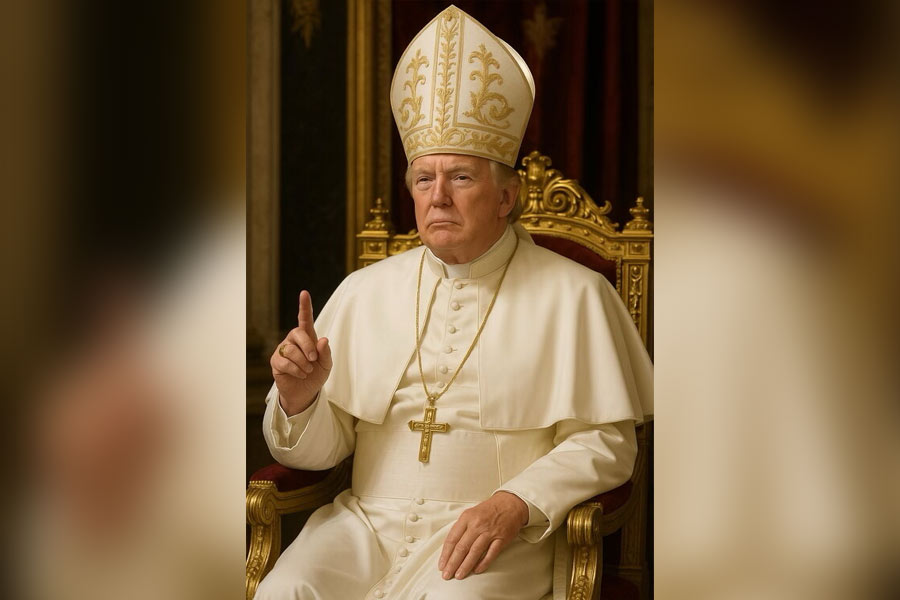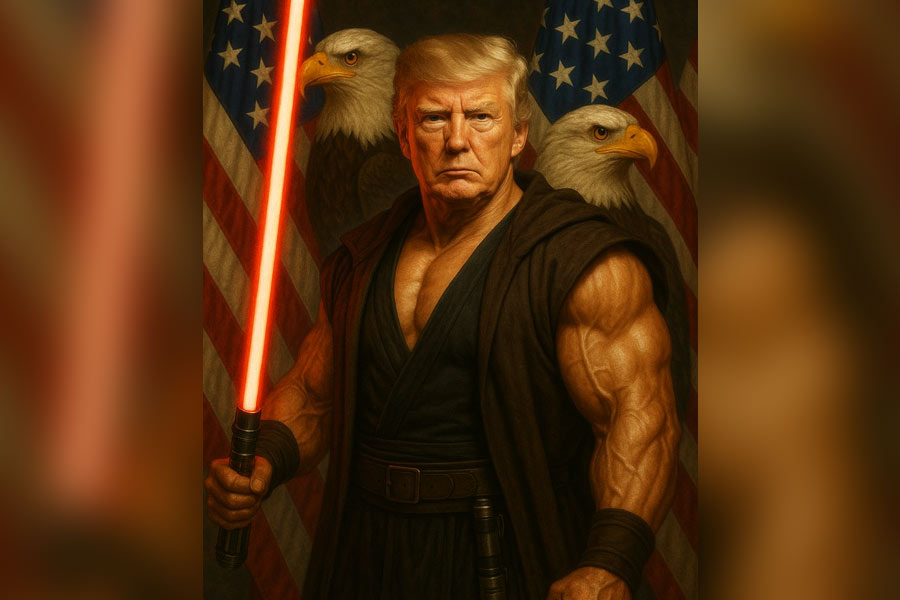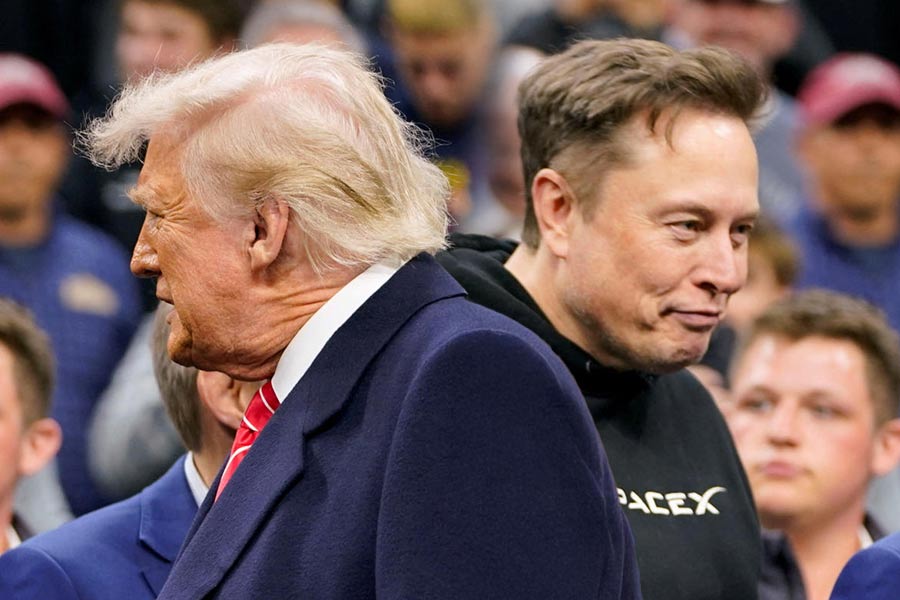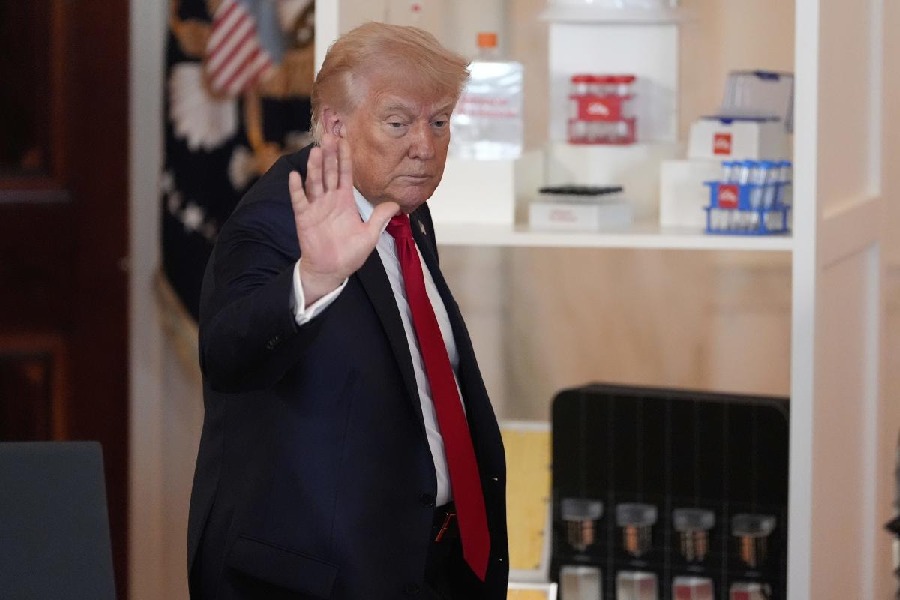Donald Trump is unstoppable. So thinks Donald Trump, at least.
Fox News may be fact-checking him on gas prices, his trusted “genius” Elon Musk might have gone from DOGE to the doghouse, but the President continues to shock and awe – on social media at least.
The White House on Sunday released a picture of Trump as a Jedi knight from the Star Wars franchise, the AI-generated image coming days after another similar image that Trump posted, of himself as the Pope.

Truth Social
“Happy May the 4th to all, including the Radical Left Lunatics who are fighting so hard to to bring Sith Lords, Murderers, Drug Lords, Dangerous Prisoners, & well known MS-13 Gang Members, back into our Galaxy. You’re not the Rebellion—you’re the Empire. May the 4th be with you,” the White House captioned the photograph.
There was, however, a slight problem. As one Star Wars fan site puts it, “Red lightsabers in Star Wars are deeply tied to power, aggression, and the unrelenting dominance of the Dark Side… [Red lightsabers]... are notorious in Star Wars as a weapon carried by the most villainous of characters, the Sith. These villains had one life purpose: to eliminate the Jedi Order and gain control as tyrants throughout the galaxy.”
As one person commented to the White House post: “How do you not have one nerd on staff to tell you what color lightsaber is good and what color is bad???”
Such trivialities do not matter to Trump. Or his supporters. One of them shot back: “People arguing Trump using a red lightsaber equates him to evil… Red is literally one of the three colors in our nation’s flag. He is the leader of the Republican Party which is often ascribed the color Red. Context matters.”
Soon after, the US President announced a 100 per cent tariff on movies produced outside the US.
The American movie industry, he said, was dying a "very fast death" due to the incentives that other countries were offering to lure filmmakers.
"This is a concerted effort by other Nations and, therefore, a National Security threat. It is, in addition to everything else, messaging and propaganda," Trump said in a post on Truth Social.
Trump said he was authorising the relevant government agencies, such as the Department of Commerce, to immediately begin the process of imposing a 100 per cent tariff on all films produced abroad that are then sent into the United States.
He added: "WE WANT MOVIES MADE IN AMERICA, AGAIN!"
Commerce Secretary Howard Lutnick posting on X said: "We're on it."
Neither Lutnick nor Trump provided any details on how the tariffs would be implemented.
It was unclear if the tariffs would apply to movies on streaming services as well as those shown in theatres, or if they would be calculated based on production costs or box office revenue. Hollywood executives were trying to sort out details on Sunday night. The Motion Picture Association, which represents the major studios, had no immediate comment.
In January, Trump appointed Hollywood veterans Jon Voight, Sylvester Stallone and Mel Gibson to bring Hollywood back "bigger, better and stronger than ever before."
Movie and TV production has been exiting Hollywood for years, heading to locations with tax incentives that make filming cheaper.
Governments around the world have increased credits and cash rebates to attract productions and capture a greater share of the $248 billion that Ampere Analysis predicts will be spent globally in 2025 to produce content.
All major media companies, including Walt Disney, Netflix and Universal Pictures, film overseas in countries such as Canada and Britain.
In 2023, about half of the spending on movie and TV projects with budgets of more than $40 million went outside the U.S., according to research firm ProdPro.
Film and television production has fallen by nearly 40% over the last decade in Hollywood's home city of Los Angeles, according to FilmLA, a non-profit that tracks the region's production.
The January wildfires accelerated concerns that producers may look outside Los Angeles, and that camera operators, costume designers, sound technicians and other behind-the-scenes workers may move out of town rather than try to rebuild in their neighborhoods.
A ProdPro survey of executives found California was the sixth most preferred place to film in the next two years, behind Toronto, Britain, Vancouver, Central Europe and Australia.
Hollywood producers and labour unions have been urging California Governor Gavin Newsom to boost the state's tax incentives to better compete with other locations.
Trump's proposed movie tariff follows a series of trade conflicts initiated by his administration, which have roiled markets and led to fears of a US recession.
Former senior Commerce official William Reinsch, a senior fellow with the Center for Strategic and International Studies, said retaliation against Trump's film tariffs would be devastating.
"The retaliation will kill our industry. We have a lot more to lose than to gain," he said, adding it would be difficult to make a national security or national emergency case for movies.
Say that to Donald Trump, the Jedi knight.












